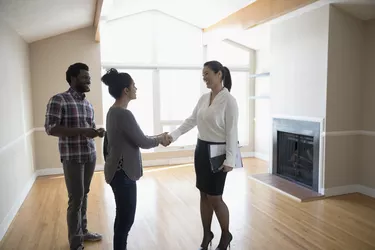
Bankruptcy gives people in financial difficulty a fresh start. Whatever type of bankruptcy you choose, the process is designed to help you eliminate or pay down some or all of your debts. As soon as the bankruptcy is closed, you're free to sell any assets you still own, including your home. Selling your home during bankruptcy is more problematic as you'll need permission from the court.
Tip
Different state laws and different types of bankruptcy filings dictate how soon you can sell your house after bankruptcy. If the court allows, you may be able to sell your home as soon as 30 days after you file bankruptcy, at the bankruptcy hearing. But depending on the particulars of your case, you may have to wait for three to six months after you file bankruptcy to sell your house.
Video of the Day
The Court Controls Your Assets
As soon as you file for Chapter 7 bankruptcy, your possessions come under the control of the court. You can't sell your home without the court's express permission. Often court will order a home sale as a stipulation of the bankruptcy – this typically happens when the house is a significant asset and the sale is required to satisfy some debts.
Video of the Day
Early Abandonment of Your Home
Depending on where you live, you may be entitled to a homestead exemption. In Chapter 7 bankruptcy, the homestead exemption protects some of your equity from creditors. If the amount of your exemption together with your mortgage loan exceeds the value of your home, the court is unlikely to order a sale. That's because the home has no value to the bankruptcy estate.
In this scenario, you can ask the court to "abandon" your home. Once the court abandons an asset, you're free to sell it even if the bankruptcy is not yet discharged.
Ball Back in Your Court
As soon as the court discharges your bankruptcy, you're free to sell any assets that you still own. A Chapter 7 bankruptcy usually discharges after three to six months. However, there are lots of unique factors in individual bankruptcy cases. The court may make specific stipulations that would delay the immediate selling of a home, such as clearing any liens and judgments secured against it.
Listing Versus Closing
Chapter 13 bankruptcy differs from Chapter 7 bankruptcy in that the debtor retains control of his property. As such, Chapter 13 debtors are free to list the home and negotiate with potential buyers during the debt repayment period agreed with the court. However, any offer accepted is conditional upon the court approving the sale.
An attorney needs plenty of time to file the required motion and to liaise with the court regarding the distribution of the sale proceeds at closing. The court may require that the debtor to deliver some or all of the sale proceeds to the court to pay down debts.
Impact on Future Purchase
Bankruptcy stays on your credit report and negatively affects your credit score for up to 10 years. Conventional mortgage lenders may preclude you from taking out a new mortgage for up to four years after your bankruptcy is discharged. The Federal Housing Administration will insure a mortgage two years after a bankruptcy discharge, but only to borrowers who have re-established good credit. So, even if you are able to sell your home, you may not be able to purchase a new one right away.